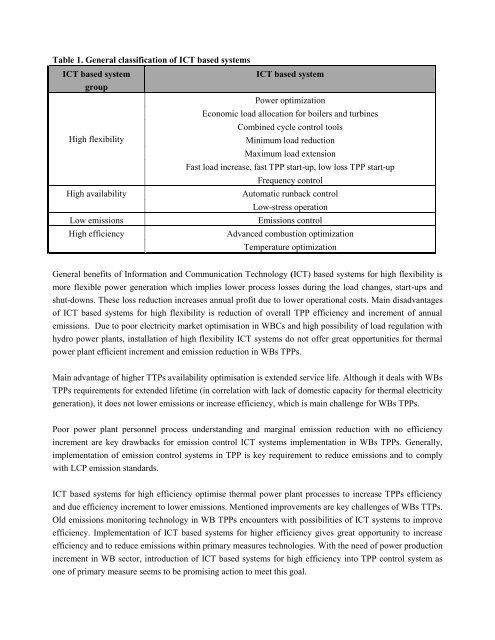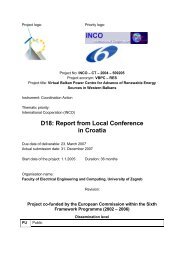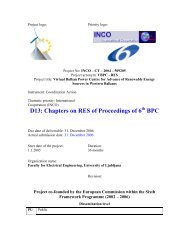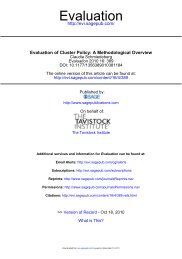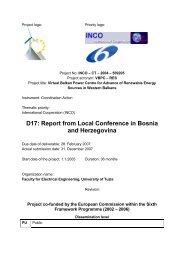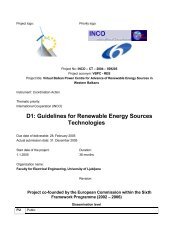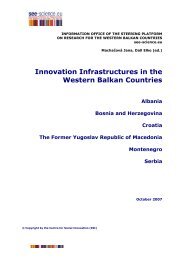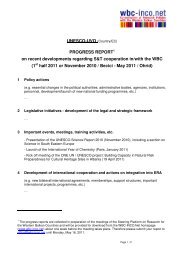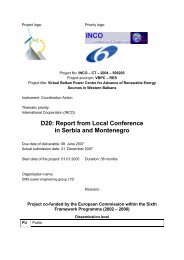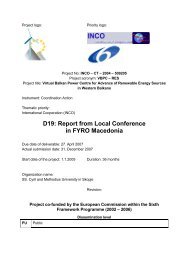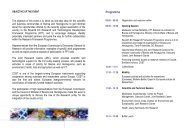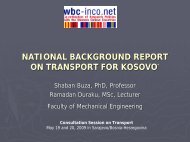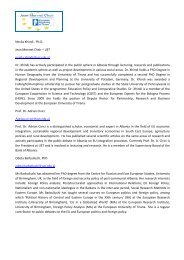Improvement of Environmental Aspects of Thermal Power Plant ...
Improvement of Environmental Aspects of Thermal Power Plant ...
Improvement of Environmental Aspects of Thermal Power Plant ...
Create successful ePaper yourself
Turn your PDF publications into a flip-book with our unique Google optimized e-Paper software.
Table 1. General classification <strong>of</strong> ICT based systems<br />
ICT based system<br />
group<br />
High flexibility<br />
ICT based system<br />
<strong>Power</strong> optimization<br />
Economic load allocation for boilers and turbines<br />
Combined cycle control tools<br />
Minimum load reduction<br />
Maximum load extension<br />
Fast load increase, fast TPP start-up, low loss TPP start-up<br />
Frequency control<br />
High availability Automatic runback control<br />
Low-stress operation<br />
Low emissions Emissions control<br />
High efficiency Advanced combustion optimization<br />
Temperature optimization<br />
General benefits <strong>of</strong> Information and Communication Technology (ICT) based systems for high flexibility is<br />
more flexible power generation which implies lower process losses during the load changes, start-ups and<br />
shut-downs. These loss reduction increases annual pr<strong>of</strong>it due to lower operational costs. Main disadvantages<br />
<strong>of</strong> ICT based systems for high flexibility is reduction <strong>of</strong> overall TPP efficiency and increment <strong>of</strong> annual<br />
emissions. Due to poor electricity market optimisation in WBCs and high possibility <strong>of</strong> load regulation with<br />
hydro power plants, installation <strong>of</strong> high flexibility ICT systems do not <strong>of</strong>fer great opportunities for thermal<br />
power plant efficient increment and emission reduction in WBs TPPs.<br />
Main advantage <strong>of</strong> higher TTPs availability optimisation is extended service life. Although it deals with WBs<br />
TPPs requirements for extended lifetime (in correlation with lack <strong>of</strong> domestic capacity for thermal electricity<br />
generation), it does not lower emissions or increase efficiency, which is main challenge for WBs TPPs.<br />
Poor power plant personnel process understanding and marginal emission reduction with no efficiency<br />
increment are key drawbacks for emission control ICT systems implementation in WBs TPPs. Generally,<br />
implementation <strong>of</strong> emission control systems in TPP is key requirement to reduce emissions and to comply<br />
with LCP emission standards.<br />
ICT based systems for high efficiency optimise thermal power plant processes to increase TPPs efficiency<br />
and due efficiency increment to lower emissions. Mentioned improvements are key challenges <strong>of</strong> WBs TTPs.<br />
Old emissions monitoring technology in WB TPPs encounters with possibilities <strong>of</strong> ICT systems to improve<br />
efficiency. Implementation <strong>of</strong> ICT based systems for higher efficiency gives great opportunity to increase<br />
efficiency and to reduce emissions within primary measures technologies. With the need <strong>of</strong> power production<br />
increment in WB sector, introduction <strong>of</strong> ICT based systems for high efficiency into TPP control system as<br />
one <strong>of</strong> primary measure seems to be promising action to meet this goal.


